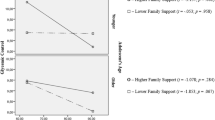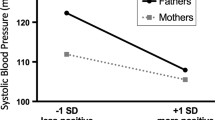Abstract
This study examined what is measured by adolescents’, mothers’, and fathers’ reports of adolescents’ adherence to the type 1 diabetes regimen and how such reports relate to HbA1c and daily blood glucose. Two-hundred fifty-two adolescents (M age = 12.49 at baseline), mothers, and 188 fathers completed an adapted Self-Care Inventory (LaGreca et al. in Child Health Care 19(3):132–139, 1990) every 6 months for 2.5 years, HbA1c was gathered from medical records, and daily number of blood glucose tests (BGT) and blood glucose mean (BGM) were obtained from glucose meters at one time point. A multitrait-multimethod approach decomposing adherence indicated that fathers’ reports reflected a stable perception across time, mothers’ reports a shared view within the family that varied with HbA1c across time, and adolescents’ reports a unique view. Fathers’ and mothers’ reports were related to HbA1c; adolescents’ reports were not, but were uniquely associated with BGT. Family members’ adherence reports capture different information across time, with implications for measuring adherence and for family processes.


Similar content being viewed by others
References
American Diabetes Association (2015). Treatment and care. http://www.diabetes.org/living-with-diabetes/treatment-and-care/?loc=lwd-slabnav. Accessed November 8, 2015.
Armstrong, B., Mackey, E. R., & Streisand, R. (2011). Parenting behavior, child functioning, and health behaviors in preadolescents with type 1 diabetes. Journal of Pediatric Psychology, 36, 1052–1061. doi:10.1093/jpepsy/jsr039
Auslander, W. F., Bubb, J., Rogge, M., & Santiago, J. V. (1993). Family stress and resources: Potential areas of intervention in children recently diagnosed with diabetes. Health and Social Work, 18, 101–113.
Berg, C. A., Butler, J. M., Osborn, P., King, G., Palmer, D., Butner, J., et al. (2008). The role of parental monitoring in understanding the benefits of parental acceptance on adolescent adherence and metabolic control of type 1 diabetes. Diabetes Care, 31, 678–683.
Campbell, D. T., & Fiske, D. W. (1959). Convergent and discriminant validation by the multitrait-multimethod matrix. Psychological Bulletin, 56, 81–105.
Diabetes Research in Children Network (DirecNet) Study Group. (2005). Diabetes self-management profile for flexible insulin regimens: Cross-sectional and longitudinal analysis of psychometric properties in a pediatric sample. Diabetes Care, 28, 2034–2035.
Dishion, T. J., Nelson, S. E., & Kavanagh, K. (2003). The family check-up with high-risk young adolescents: Preventing early-onset substance use by parent monitoring. Behavior Therapy, 34, 553–571.
Fortenberry, K., Berg, C. A., King, P. S., Stump, T., Butler, J. M., Pham, P. K., et al. (2014). Longitudinal trajectories of illness perceptions among adolescents with type 1 diabetes. Journal of Pediatric Psychology, 39, 687–696.
Guilfoyle, S. M., Crimmins, N. A., & Hood, K. K. (2011). Blood glucose monitoring and glycemic control in adolescents with type 1 diabetes: Meter downloads versus self-report. Pediatric Diabetes, 12, 560–566.
Herge, W. M., Streisand, R., Chen, R., Holmes, C., Kumar, A., & Mackey, E. R. (2012). Family and youth factors associated with health beliefs and health outcomes in youth with type 1 diabetes. Journal of Pediatric Psychology, 37, 980–989.
Hilliard, M. E., Guilfoyle, S. M., Dolan, L. M., & Hood, K. K. (2011a). Prediction of adolescents’ glycemic control 1 year after diabetes-specific family conflict: The mediating role of blood glucose monitoring adherence. Archives of Pediatric Adolescent Medicine, 165, 624–629.
Hilliard, M. E., Rohan, J. M., Carle, A. C., Pendley, J. S., Delamater, A., & Drotar, D. (2011b). Fathers’ involvement in preadolescents’ diabetes adherence and glycemic control. Journal of Pediatric Psychology, 36, 911–922. doi:10.1093/jpepsy/jsr020
Hilliard, M. E., Wu, Y. P., Rausch, J., Dolan, L. M., & Hood, K. K. (2013). Predictors of deteriorations in diabetes management and control in adolescents with type 1 diabetes. Journal of Adolescent Health, 52, 28–34.
Holmbeck, G. N., Li, S. T., Schurman, J. V., Friedman, D., & Coakley, R. M. (2002). Collecting and managing multisource and multimethod data in studies of pediatric populations. Journal of Pediatric Psychology, 27, 5–18.
Hood, K. K., Peterson, C. M., Rohan, J. M., & Drotar, D. (2009). Association between adherence and glycemic control in pediatric type 1 diabetes: A meta-analysis. Pediatrics. doi:10.1542/peds.2009-0207
Joreskog, K. G. (1978). Structural analysis of covariance and correlation matrices. Psychometrika, 43, 443–477.
Kichler, J. C., Kaugars, A. S., Maglio, K., & Alemzadeh, R. (2012). Exploratory analysis of the relationships among different methods of assessing adherence and glycemic control in youth with type 1 diabetes mellitus. Health Psychology, 31, 35–42.
King, P. S., Berg, C. A., Butner, J., Butler, J. M., & Wiebe, D. J. (2014). Longitudinal trajectories of parental involvement in type 1 diabetes and adolescents’ adherence. Health Psychology, 33, 424–432.
LaGreca, A. M., Follansbee, D., & Skyler, J. S. (1990). Developmental and behavioral aspects of diabetes management in youngsters. Children’s Health Care, 19, 132–139.
Larson, R., & Richards, M. H. (1991). Daily companionship in late childhood and early adolescence: Changing developmental context. Child Development, 62, 284–300.
Lewin, A. B., LaGreca, A. M., Geffken, G. R., Williams, L. B., Duke, D. C., Storch, E. A., et al. (2009). Validity and reliaiblity of an adolescent and parent rating scale of type 1 diabetes adherence behaviors: The Self-Care Inventory (SCI). Journal of Pediatric Psychology, 34, 999–1007.
Mackey, E. R., Hilliard, M. E., Berger, S. H., Streisand, R., Chen, R., & Holmes, C. (2011). Individual and family strengths: An examination of the relation to disease management and metabolic control in youth with type 1 diabetes. Families, Systems, & Health, 29, 314–326.
Marsh, H. W., & Bailey, M. (1991). Confirmatory factor analyses of multitrait-multimethod data: A comparison of alternative models. Applied Psychological Measurement, 15, 47–70.
Miller, V. A., & Drotar, D. (2003). Discrepancies between mother and adolescent perceptions of diabetes-related decision-making autonomy and their relationship to diabetes-related conflict and adherence to treatment. Journal of Pediatric Psychology, 28, 265–274.
Osborn, P., Berg, C. A., Hughes, A. E., Pham, P., & Wiebe, D. J. (2013). What mom and dad don’t know can hurt you: Adolescent disclosure to and secrecy from parents about type 1 diabetes. Journal of Pediatric Psychology, 38, 141–150. doi:10.1093/jpepsy/jss102
Patino-Fernandez, A. M., Eidson, M., Sanchez, J., & Delamater, A. M. (2009). What do youth with type 1 diabetes know about the HbA1c test? Children’s Health Care, 38, 157–167.
Saudek, C. D., Derr, R. L., & Kalyani, R. R. (2006). Assessing glycemia in diabetes using self-monitoring blood glucose and hemoglobin A1c. Journal of the American Medical Association, 295, 1688–1697. doi:10.1001/jama.295.14.1688
Sood, E. D., Pendley, J. S., Delamater, A. M., Rohan, J. M., Pulgaron, E. R., & Drotar, D. (2012). Mother-father informant discrepancies regarding diabetes management: Associations with diabetes-specific family conflict and glycemic control. Health Psychology, 31, 571–579.
Widaman, K. F. (1985). Hierarchically nested covariance structure models for multitrait-multimethod data. Applied Psychological Measurement, 9, 1–26.
Wiebe, D. J., Chow, C. M., Palmer, D. L., Butner, J., Butler, J. M., Osborn, P., et al. (2014). Developmental factors associated with longitudinal declines in parental responsibility and adherence to type 1 diabetes management across adolescence. Journal of Pediatric Psychology, 39, 532–541.
Wysocki, T., Harris, M. A., Buckloh, L. M., Mertlich, D., Lochrie, A. S., Taylor, A., et al. (2008). Randomized, controlled trial of behavioral family systems therapy for diabetes: Maintenance and generalization of effects on parent-adolescent communication. Behavior Therapy, 39, 33–46.
Acknowledgments
The project was supported by R01DK063044 from the National Institute of Diabetes and Digestive and Kidney Diseases. The content is solely the responsibility of the authors and does not necessarily represent the official views of the National Institute of Diabetes and Digestive and Kidney Diseases or the National Institutes of Health. We thank the families who participated, the staff of the Utah Diabetes Center and Michael Swinyard’s practice, as well as the additional members of the ADAPT team (David Donaldson, Rob Lindsay, Mary Murray, Mike Swinyard). We also thank Meagan Ramsey and Travis Wilshire for reviewing a previous draft of this paper.
Funding
The project was supported by R01DK063044 from the National Institute of Diabetes and Digestive and Kidney Diseases.
Author information
Authors and Affiliations
Corresponding author
Ethics declarations
Conflict of interest
Cynthia A. Berg, Jonathan E. Butner, Sara L. Turner, Amy Hughes Lansing, Pamela King, and Deborah J. Wiebe declare that they have no conflicts of interest.
Human and animal rights and Informed consent
All procedures followed were in accordance with ethical standards of the responsible committee on human experimentation (institutional and national) and with the Helsinki Declaration of 1975, as revised in 2000. Informed consent was obtained from all patients for being included in the study.
Rights and permissions
About this article
Cite this article
Berg, C.A., Butner, J.E., Turner, S.L. et al. Adolescents’, mothers’, and fathers’ reports of adherence across adolescence and their relation to HbA1c and daily blood glucose. J Behav Med 39, 1009–1019 (2016). https://doi.org/10.1007/s10865-016-9771-5
Received:
Accepted:
Published:
Issue Date:
DOI: https://doi.org/10.1007/s10865-016-9771-5




